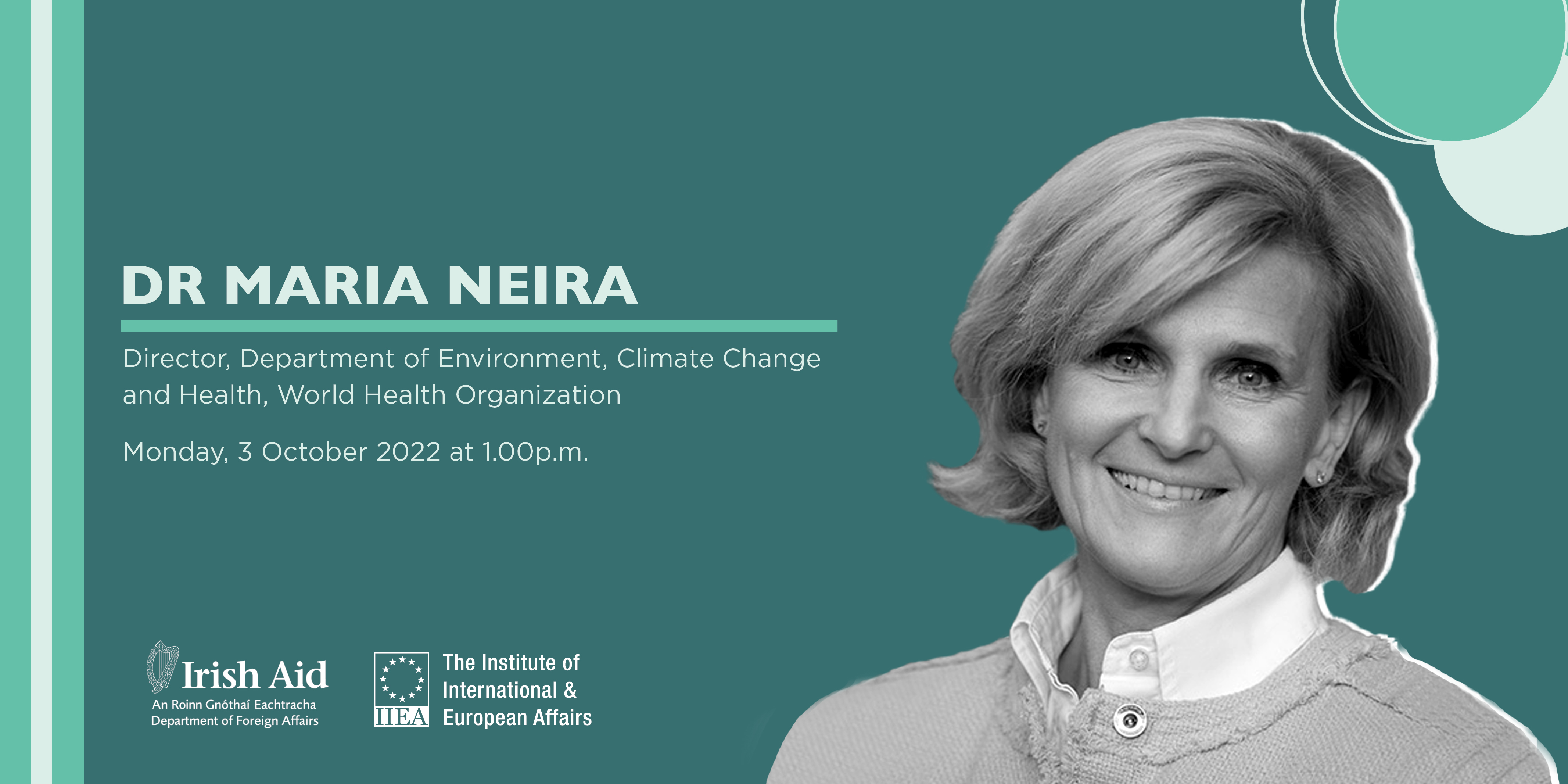Future Proofing the Climate-Health Nexus

Author: Keelin O'Sullivan
In the fourth lecture of the 2022 Development Matters series, supported by Irish Aid, the IIEA hosted Dr Maria Neira, Director of the Department of Environment, Climate Change and Health at the World Health Organization (WHO). In her address, Dr Neira discussed the benefits of putting health at the core of climate action and sustainable development and outlined practical solutions to achieve this. This webinar was chaired by Caoimhe de Barra, CEO of Trócaire.
In opening remarks, H.E. Mr Michael Gaffey, Director General of Irish Aid, highlighted Ireland’s active response to climate action internationally, both through diplomacy and in its development programme. Ireland’s 2023 budget saw a 17% increase in official development assistance (ODA) to €1.2 billion, the highest amount ever provided for by the Government of Ireland. This increase, Director General Gaffey explained, allows for Ireland to continue to address growing, significant, and interlocking issues, such as climate change mitigation and the impact of climate change on global health. He affirmed that climate change and environmental degradation threaten our ability to maintain good health.
Throughout the webinar, Dr Neira presented strong evidence-based arguments to demonstrate that climate change is impacting global and personal health. Polluted air, she argued, is indiscriminate and its impact is felt globally, as each year exposure leads to seven million premature deaths. Health systems around the world, from the most sophisticated hospitals in high-income nations to health centres in developing nations, are paying the price for climate change and this, according to Dr Neira, refutes the argument that climate change mitigation is too expensive as a policy position. Health centres in developing nations, in particular, are dealing with diseases, such as dengue and malaria, which are exacerbated by climate change
She contended that scientific evidence and the combined cost of climate change on economies and human health should instil more urgency to place health at the core of climate action. Dr Neira prescribed four solutions to tackle the causes of climate change, while investing in global health and clean air.
- Transition towards clean renewable energy.
- Acceleration of human health centric planning and city design.
- Sustainable food systems.
- Enhanced health systems and facilities.
COP27 and Developing Nations
Dr Neira lamented the fact that those who contribute most to climate change will suffer the least in terms of the health of their populations and health systems, while developing nations who have contributed least to climate change will be most impacted. For example, 2022 has seen severe climate disasters across the globe, such as flooding in Pakistan and drought in the Horn of Africa.
Dr Neira recalled the commitment made by middle- and high-income countries at COP26 to reduce their carbon footprint. She highlighted that a focus of COP27, taking place on the continent of Africa, will be loss and damage, in terms of loss of land and resources and damage to eco-systems. At COP27, she added, wealthy countries must take responsibility for the impact they have on climate change in the developing world. She emphasised that developing nations need to be supported in moving towards renewable energy and to learn from the mistakes of more developed nations in areas such as coal mining. Investment in clean and renewable energy solutions, such as solar panels is one step that can be taken to mitigate climate catastrophe.
Humanitarian Community
Discussing innovative solutions, Dr Neira looked to the nature of the climate-health nexus in humanitarian contexts. She explained that the focus needs to shift to the opportunities in this space, for example moving away from sending diesel to healthcare facilities and from using asbestos for pipes in buildings, in order to ensure that healthcare facilities being built in developing nations are the most energy efficient. She also called on the international humanitarian community to ensure healthcare facilities provide basic WASH (Water, Sanitation and Hygiene) facilities. She recalled that primary recommendation for preventing the spread of COVID-19 was to wash your hands, however people across the developing world did not have access to these basic facilities, even in healthcare settings. Webinar chair, Caoimhe de Barra, cited a recent WHO report which found that 50% of global healthcare facilities did not meet basic WASH facilities.
Discussing the dependence on biomass fuels for cooking in developing nations, Dr Neira highlighted its harmful impact on the approximately 2.4 billion people who rely on it. She also pointed to the gender-based dimension of this practice, whereby in most cases it is women and girls who are at the face of the fumes, often with young children close by. Clean fuel, she concluded, is an important step that needs to be taken at a household level to mitigate the negative impacts on health and climate change.
Conclusion
Dr Neira’s intervention emphasised the overlap between climate mitigation strategies and public health initiatives. Prevention, investment, mitigation, and acceleration, with human health at the core provides not only an opportunity to decrease the global impact of climate change but also to support the achievement of the Sustainable Development Goals.
